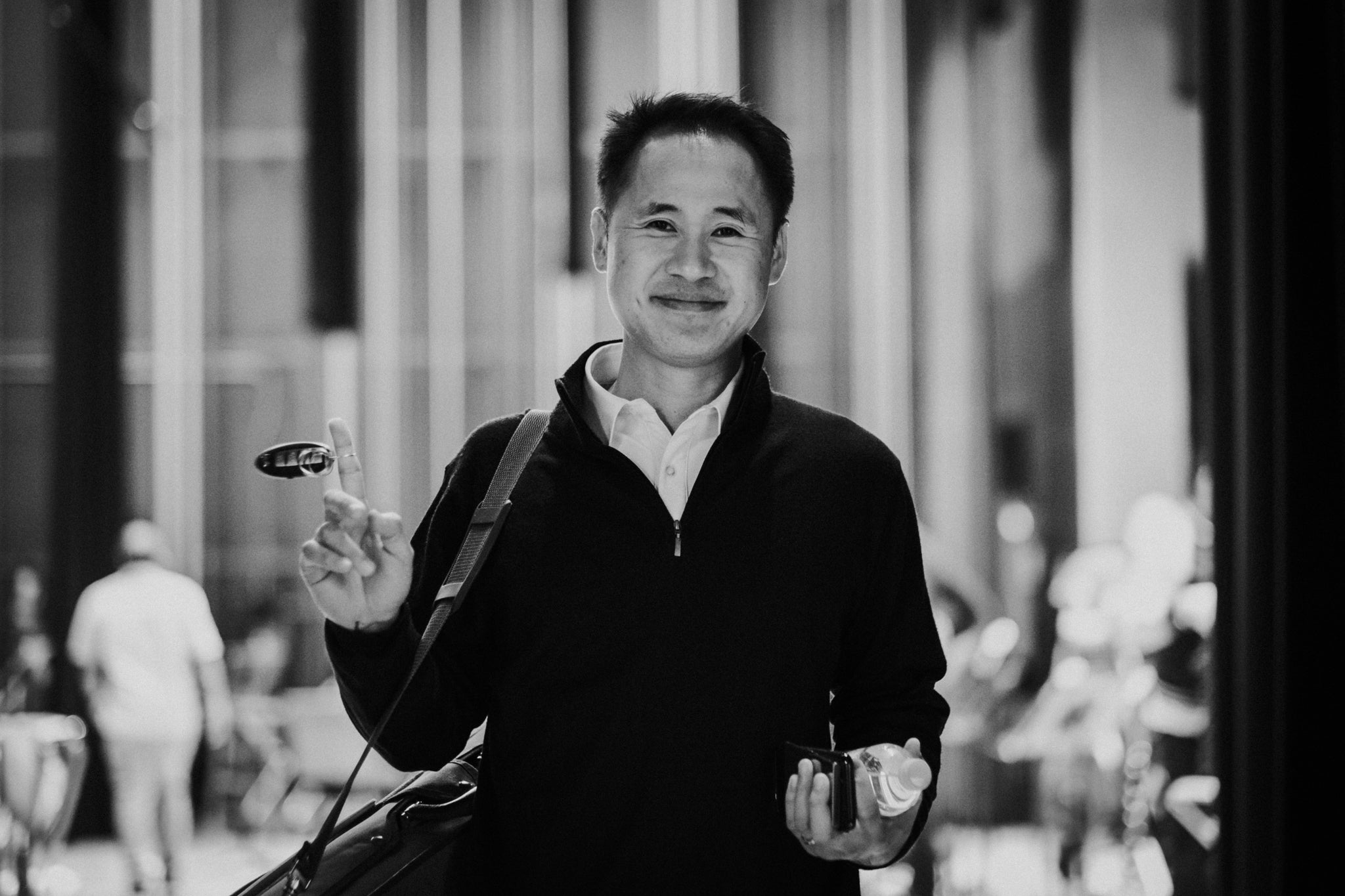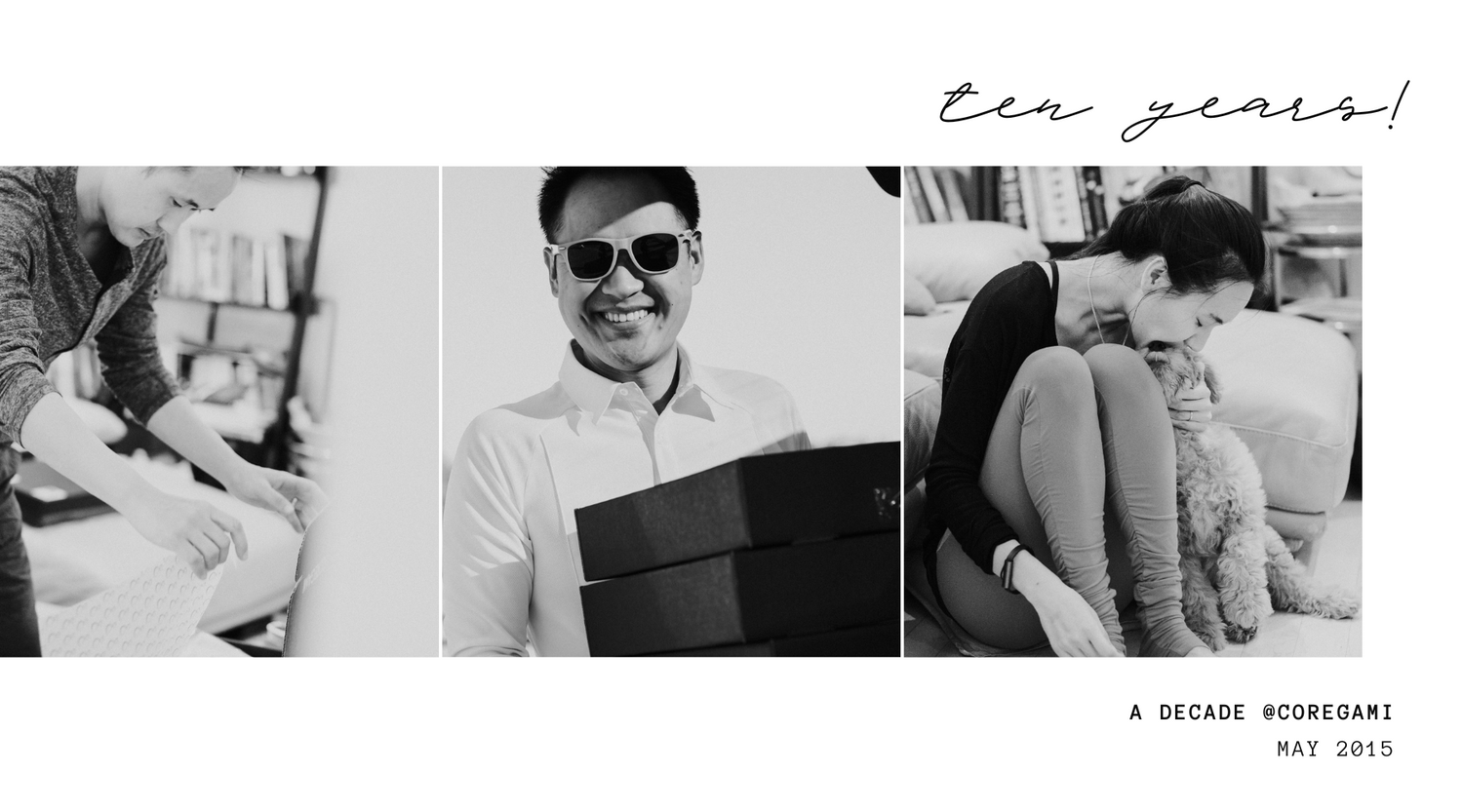When Coregami’s founder, Kevin Yu, asked me to write for him a few months back, I was a little confused.
I’m an action sports writer. I cover activities like mountaineering, whitewater kayaking, surfing, and trail running. I write for brands that make ice axes and down parkas, not performance shirts for classical musicians. Why would he want me?
That’s when he told me what Coregami stood for.

Kevin Yu, the brains behind Coregami's unique vision: craft technical performance apparel for classical musicians, in the mold of athletic-wear
“The same processes that go into crafting performance apparel for athletes… that’s what I’m bringing to the classical music space,” Yu said. “The same level of utility and functionality, the same focus on comfort and performance, in addition to style.” The more I thought about it, the more I understood. A technical jacket worn by an alpinist on an 8,000-meter peak in the Himalaya or Karakoram isn’t so different from the performance apparel needed by a top-level musician.
Both need moisture-wicking capabilities. Both need a snug, form-fitting design, without superfluous fabric, that still provides a full range of motion. The similarities run deeper than they might seem at first glance.
I was hooked. It would be different from any other assignment I’d had before.
The reason I mention this is to let you, the reader, know where I’m coming from. I’m not a performing artist. Hell, I’m not even a musician at all. I’m just someone who appreciates the value of high-quality performance apparel, whether it’s in the mountains, the jungle, or on stage.
That’s why I’m here, and it’s just a small part of what makes Coregami so unique.
Getting Lost to Tune In
Like many musicians, Yu’s background in music stretches back to early childhood. Born in Singapore and raised in Singapore, Malaysia, and Taiwan during his early years, his family finally settled in Richardson, Texas, when he was eight. The year was 1985. Yu barely spoke English, but managed to make fast friends in the neighborhood. “Each day after school, a large pack of us would ride our bicycles around the neighborhood,” he said. “It was the closest I had ever felt to being a part of a gang.”
At that age and time, most young kids were learning to play the piano, but Yu had just finished a book on Scotland and was obsessed with the idea of learning the bagpipes. No luck. Instead, his parents sent him to violin lessons with a violinist at the local church.
“[The teacher] was formerly in the military and he turned every lesson into basic training,” Yu said. “I’ve never met anyone whose love for music burned as much as him. He passed along that love for music to all his students. Forty years later, it’s really why I’m still playing today.”
He was also an avid athlete. His father was extremely athletic, and when the family moved to America, he expected all his boys to play sports. “Growing up in my neighborhood, every kid had to play soccer,” Yu said. “And with huge Coke-bottle glasses, I remember being the first Asian kid to play on the school basketball team.”
Later, Yu made the varsity tennis team, too. He continued playing sports through high school. “Things look a lot different today,” he admitted. “As a parent with two little girls growing up in the middle of a pandemic, I’ve been slowly cultivating the most incredible dad-bod you’ve ever seen.”
In addition to athletics, he was winning prizes and catching attention as a musician as a teenager, but during his senior year of high school, his parents put the brakes on. They wouldn’t support him in a music career. He had to find a different path.
So he went the straight and narrow, first to business school, and then, upon graduation, to desk jobs at the tech company Cisco Systems, the accounting firm KPMG, and the natural gas distributor Atmos Energy, among others.
These gigs paid the bills, but he held no passion for them.
Still, he was playing music all the while. “I was working by day and performing by night,” he said. “After work, I’d rush to rehearsal until 10:00 pm. And the next day, I’d do the same. It was a grueling schedule that went on for years.”

Yu still plays (and teaches) the violin today. Here, he works with one of his students in Dallas.
By 2013, he’d hit a wall. “Professionally, musically, and also financially, I had reached my personal goals,” he said. “I should’ve been fat and happy, but truthfully, I didn’t have much else. I felt a bit empty inside.”
His life was fulfilling on the outside, but it was all background noise. The real signal had been drowned out by all these tangential goals: making X amount of money, achieving X milestone in his career, and so on.
Over a cup of instant noodles one day, a friend told him about the El Camino de Santiago, a 500-mile trail across Spain. It was just the kick Yu needed. He bought a plane ticket the very next morning.
“Two weeks later, I was walking across Spain on foot,” he said. “After walking for 30 days, I just kept going. I went to Istanbul, Berlin, Sophia, and later Hermosa Beach and San Francisco. I read a ton of books, met interesting people, and stuffed myself with street food.”
Over this year-long stretch of rehabilitation, the background noise clouding Yu’s mind slowly went away. “I could hear the signal again,” he said.
Invisible Garments
The idea for Coregami came about because Yu wanted to solve problems, plain and simple.
“While in San Francisco, a buddy and successful entrepreneur told me, ‘If you solve your own problem, you will have at least one customer.’ He really got me thinking,” Yu said.
One of the biggest problems he had as a musician was his uniform. Training for hours each day, with a rigorous practice regime, necessitates no small amount of physical endurance and poise. All serious musicians know this.
“But the instant that we walk on stage with our thick tuxedo jackets, stiff tux shirts, and bow ties… Strange things start to happen,” Yu said. “Our apparel starts to dictate our motion, and we start to miss notes. I remember rushing off stage one night in a sweaty mess, thinking to myself, “There’s got to be a better way!’”
Yu’s wife is an Ashtanga yoga practitioner, and Yu also practices yoga daily, keeping a yoga mat next to his bed. The first thing he does each morning is a yoga sequence, both out of necessity (back injuries) and as a focusing exercise.
So, between his wife’s yoga expertise and his athletic background (he remains an avid tennis player today), the Yu Family is intimately familiar with athletic and leisurewear.
“While trail running one day, I looked down at my shirt and realized how comfortable I was,” Yu said. “I asked myself ‘Why can’t I be THIS comfortable while I’m on stage?’”
He decided to solve the problem for himself and other musicians like him. Coregami was born.
“We want our artists to feel that the garment is nearly ‘invisible,’” he said. “They should have a natural range of motion and feel incredibly light. For many of our musicians, it's the first time they feel liberated and unencumbered while performing on center stage.”

A stack of Coregami shirts ready for shipment.
This goal, for apparel to offer a natural, unencumbered fit and range of motion, comes from many influences, including a focus on health.
“My father died of a stroke when he was only 55 years old,” Yu said. “The last we saw of him was at a hospital a few miles from his office. He was the hardest worker I knew.” With that in mind, Yu aims for Coregami to keep musicians as comfortable (and stress-free) as possible.
No musician wants to be sweating bullets while performing on stage, jammed into a stuffy vest or shirt that feels more like a straightjacket than a piece of performance apparel. Coregami solves that problem once and for all.
Less is More
The philosophy behind Coregami’s product design, and the brand model itself, incorporates many other aspects of Yu’s personal philosophy and taste.
Musically, he’s particularly fond of the minimalist compositions of Max Richter, and noted that “I find many startup founders to be a little too loud and much too bold… Somewhat maximalist. I believe that ‘less is more’ and that we should operate softly and quickly.

Yu in his happy place, playing the instrument he loves.
Even the story behind the name “Coregami” echoes this philosophy of minimalism and the idea of a combination of beauty and function.
When I first heard the word “Coregami,” I thought perhaps it was a word in a foreign language, but in actuality, Yu conjured the word himself.
It’s a combination of two words, said Yu: CORE (as in the core of one’s body), and ORIGAMI (the art of folding thin sheets of paper into different objects).
“Back in 2015, I spent a lot of time wandering across the Los Angeles garment district,” he said. “A gentleman pulled out a giant roll of white fabric and unfurled it across the air and onto a giant table. It reminded me of the origami paper that we used to play with as kids.”
The transmutability of a simple piece of origami paper, able to mold into the form of everything from cranes to unicorns to elephants, held exactly the same characteristics Yu wanted out of his performance apparel.
The inspiration stuck, but at the end of the day, practicality played an equal role in the name, just like it does in Coregami’s function-first apparel design. “Domain names have become increasingly expensive,” Yu said, “and for a lot of startups, the cost can be prohibitive. For $12.99, I purchased the name Coregami on GoDaddy.com.”
Lights Dimmed, but Still Going
The path hasn’t been easy for Coregami, of late. “We’ve had a ton of interest from investors, but today, we remain bootstrapped and independent,” he said. The pandemic has been a huge setback, too.
“We thought it might drown us,” Yu said. “But luckily, we are still profitable, with no debt and very little overhead. During hard times, we simply dimmed the lights and kept going.”
The biggest challenge for Coregami, however, is and always has been product design and manufacturing. “Coregami sits at the intersection of formal and athletic apparel,” Yu said. “While these categories have a lot of similarities, they have completely different philosophies in terms of aesthetics and functionality. Finding the right designers and production partners continues to be our biggest challenge and our biggest opportunity.”

Coregami was recently featured in the New York Times.
While Yu noted that landing on the cover of the New York Times is one of his proudest moments, equally fulfilling is the feedback he gets from his happy musicians. Above all, he said, “We are artists serving artists. We hire musicians. We train musicians. We serve musicians.”
With that goal in mind, Coregami is actively branching out into new styles and fits of apparel, too.
“Since Coregami opened its doors, our inbox has been flooded with requests from our female artists,” Yu said. “In the design phase, we generally begin with the end in mind. However, the more questions we asked, the more clear it became that it is no one-size-fits-all. We’ve had to return to the drawing boards a few times.”
“But coming in the fall of 2022, we hope to have a nice surprise for everyone.” 
Good things soon to come!





